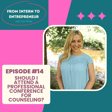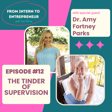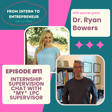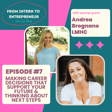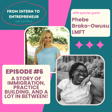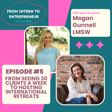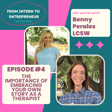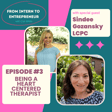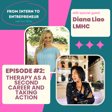Corey's Journey to a Six-Figure Practice
00:00:00
Speaker
This is from intern to entrepreneur, the podcast for counseling and therapy graduate students who want to start planning their journey to private practice while they're still in grad school. I'm your host Corey White. And within three years of graduating from my master's program, I had a six figure thriving private practice in large part because I started planning my path while I was still in grad school.
00:00:21
Speaker
This podcast is full of stories and information meant to give you ideas about how you can carve your own path to the therapy career that you want. Please note that when you're listening to this podcast, licensure laws and requirements vary from state to state. So check with your state board about what you can and can't do on your journey. And without further ado, enjoy this episode of From Intern to Entrepreneur.
Celebrating Podcast Milestones
00:00:46
Speaker
Oh, hey there, grad students. This is episode eight of From Interred to Entrepreneur. And before we get into today's interview, I just want to pause to say that this morning before I recorded this, I went on to my podcast analytics to see, you know, are people listening? Are they not listening? And I saw that from the first seven episodes, there have been 250 plays of this podcast. Now, that's not a huge number.
00:01:14
Speaker
But it also kind of does feel like a huge number because as I look at that, it means that there's like 36 people that are listening to each episode. OK, really, it's 35 because I listen to each one. So I guess I need to subtract myself from that. I need to make sure that they sound good from start to finish.
00:01:31
Speaker
Okay, but 35. And when you're starting something new, like this is what I want to be a teachable moment to anybody listening to this right now. When you're starting something new, like potentially opening a practice, it's the little numbers that are going to add up. So like, yeah, in the grand scheme of things, like, I would really like to have more than 250 plays on this podcast to really make it worth my time.
00:01:55
Speaker
But I'm also going, I just started this shit. And so that feels really good. So celebrate your small wins and I'm celebrating this one. But anyway, the podcast today, the interview is with Beth Gustin.
Beth's Path to Private Practice
00:02:09
Speaker
Beth is a licensed professional counselor.
00:02:12
Speaker
And after she was working as a blindness skills trainer and a program manager for an independent living center and is a therapist at two community health centers, she decided it was time for her to go full-time private practice. She specializes in disenfranchised grief, including service dog and pet loss grief that's so important, human death loss, and grief related to living with a disability. In her downtime, she enjoys reading and spending time with family and friends and being in nature.
00:02:40
Speaker
One of my favorite things about Beth's interview is that she talks about how this was her third attempt at private practice. And she talks about some of the struggles and the things that she wished she knew. And I just think it's so important that we're talking about the things that we struggled with and not just our wins. And not just sort of seeing people and going, wow, like,
00:03:00
Speaker
They have it all together, hearing about the things that we wish we knew and the attempts that we've made at things that we had to go back and learn more before they were really going to be what we want them to be. And that's sort of Beth's story. So I'm going to let Beth tell her own story though. She's so good at doing it. I hope you guys learn something from her and feel inspired by her story. So grad students, meet Beth.
00:03:29
Speaker
Hi, Beth. It's so good to have you on the podcast today. I'm so happy that you're here. I'm really glad to be here. Thank you for having me.
Becoming a Therapist: Influences & Challenges
00:03:37
Speaker
Yeah. So I want to jump right into it and get started by having you tell our listeners, our grad student listeners a little bit about your journey to being a therapist and then also your journey to being in private practice and all the twists and turns that you had along those ways.
00:03:56
Speaker
Sure. So I think as with many of us, it was a long and winding road that is still evolving. So just for reference point, I graduated because I'm old, like back in 05. So that seems like a long time ago, but prior to that point, I always knew I wanted to be a therapist or in the helping professions in some way.
00:04:19
Speaker
Both my parents were teachers, and when I was in eighth grade, I was a peer counselor, so I got to talk with the sixth and seventh graders, mainly sixth graders, about their challenges kind of going from elementary school to middle school. So that's sort of set me on the path. Yeah, this has been in your bones. It has, yes, yes. There's a slight delay, so I apologize for that, because
00:04:43
Speaker
I don't hear you until I'm still talking. That's okay. We'll run with it. Okay. Uh, yes, I was
Volunteering & Job Challenges Post-Grad
00:04:50
Speaker
in my bones. Uh, so then I had a lot of personal experience with loss throughout the years. Um, both from deaths by suicide of people I knew, uh, death from cancer of relatives and things like that. And so combined that with all the pet loss that I experienced growing up that further cemented the
00:05:10
Speaker
therapy is where I was meant to be. I originally wanted to be a music therapist and then for some personal reasons at the time of my life when I was starting college decided that didn't make sense and so then I was looking into play therapy and being totally blind I was discouraged from that. Looking back I think I could have found ways to have made that work but at that time I didn't.
00:05:37
Speaker
So, throughout college and grad school, I actually was on the couples and family track and decided that after grad school
00:05:48
Speaker
Well, after grad school, it was hard to get a job for me. So I had volunteered a lot because there's these things called licensure hours you have to get to get your license. And I was panicking because I couldn't get a job right out of grad school. So I volunteered a lot at a hospice, at an adult daycare, at a homeless shelter, and did a lot of that kind of work to get my hours for licensure. And got my first job as a contract therapist for about six months.
Creating Mental Health Programs
00:06:19
Speaker
And then I transitioned from that to something totally off track, which was a, what they call a low vision or blindness skills trainer at an independent living center, which for those of you who don't know, independent living centers are places that work with clients of all different disabilities and help them to either maintain or regain independence when they are experiencing a disability. So through them,
00:06:44
Speaker
I actually became a program manager and I started what we call the life skills and adjustment counseling program because I saw a need for mental health support for these individuals who were experiencing an acquired disability, in my case, vision loss. And so I did that for about six to eight years and then left to do community mental health work because I wanted to follow my passion, which was full-time mental health therapy.
00:07:12
Speaker
And I worked at two community mental health agencies and now I'm finally in full-time private practice.
Focus on Grief and Loss
00:07:17
Speaker
And I've also experienced some service dog deaths along the way and more pet loss and human loss. And so all this to say grief and loss just made sense as my focus and where I am meant to be. And further kind of specializing in service dog and pet loss grief also has made sense.
00:07:39
Speaker
But it's been a very long and winding road to get here. I always know I wanted, like I said, to be a therapist. I always wanted my own practice. Didn't quite know how to get there. And I am, finally. But it was definitely a much longer road than I thought it would be. This is my third attempt in private practice, and it's working this time. Can you tell us a little bit about that, your third attempt?
Lessons from Private Practice Attempts
00:08:00
Speaker
So when I was trying to get employed after grad school, I tried private practice with some supervision
00:08:10
Speaker
supervisors encouragement. And then I dropped that the first time when I acquired a full-time job. And then I tried it again when I was trying to transition out of being a program manager. And then I got a job at a community health agency. So I dropped it again. So I think that's a really cool part of your story because I think often
00:08:34
Speaker
we think about our stories and we go, okay, well, when I do this, when I decided I'm gonna have a chiropractic, I'm just gonna have it. And what you're saying is that you tried it twice and it didn't quite work out. Is there anything, do you, how do I say this? Is there anything that you know now that if you knew back then it would have made it successful the first or second time around?
Networking for Success
00:09:00
Speaker
This might be a little repetitive throughout the podcast. But if I had known, A, that private practice was more of an option outside of grad school, because when I was going to grad school, that really wasn't talked about as a direction we could go. And there weren't a lot of group practice owners that I was aware of who hired interns. So I didn't know that was even an option. But also, I think networking would have been key to help me become more successful the first and or second time around.
00:09:30
Speaker
And I didn't know how to do that back then. How did you learn how to do that now?
Community Involvement & Learning
00:09:35
Speaker
I think just talking to their therapist, I belong to something called Practice of the Practice, which is a monthly membership group. And through them, you have a lot of pre-recorded video content to learn about the building of private practice from the ground up and from naming it to writing blogs to SEO to
00:09:56
Speaker
anything and everything to becoming what they call a group practice boss. So you can go from solo practitioner all the way through group practice and then they're branching out and out into how to become public speaker and author and things like that. But through them, because it's a really supportive community, I learned about some tips on how to network. And I believe in maintaining good relationships with anyone you meet and building those relationships and building those bridges. And I also took some trainings on public speaking because it's something else I would like to do.
00:10:26
Speaker
And through those trainings combined with practice of the practice, I just learned, one, the importance of networking, and two, I've learned some ways on how to network more effectively.
Support from Peer Groups
00:10:38
Speaker
Hey, grad students. Real quick, before we get back to this interview, if you are loving the idea of being a part of a community of like-minded graduate students who want to own their own private practice one day, then you need to head to Facebook and join my Facebook group from intern to entrepreneur. There's already a community set up of graduate students who one day want to own their own private practices and be entrepreneurs just like you.
00:11:04
Speaker
So head over to Facebook, join that group and stay in the loop and get connected with people who are doing things that you want to do. Back to the interview.
Private Pay Practice Insights
00:11:17
Speaker
When you're in grad school, you may not know where you're gonna end up. I did not initially plan to specialize in grief and loss back then. But networking would have helped me realize all of my options available to me. It would have helped me realize
00:11:33
Speaker
how to build referral sources and how to be successful in private practice. For me, I've chosen to do a completely private pay practice. I don't take insurance. And that's another road you can go down. But again, these things were not talked about when I was in grad school.
00:11:51
Speaker
Yeah. And I think to some extent that is still the case. I think that certainly now it is more available. I graduated from my grad program in 2017 and I imagine that it was
Building a Private Pay Practice
00:12:07
Speaker
talked about more in 2017 that it was in 2005 and more in 2003 than in 17, but I think still largely
00:12:16
Speaker
There are a lot of programs that are afraid to talk about private practice because I don't know. I guess what I make up is that they're afraid that students aren't ready for it or that it's unethical in some way or, you know, I don't know. So part of what I'm trying to do here is have people like you come and tell the stories about, yeah, I wish I would have known how to network because that would have helped me get to where I wanted to be quicker.
00:12:41
Speaker
Absolutely. Do you think that networking now is a main driver into your current success as a private practice therapist? So I'm still building a caseload. Um, I was doing really well with that. And then I kind of had a slump as a lot of us did the past couple months. Um, so I think finding your marketing strategy that you are comfortable with, is it social media marketing, which I also do. So I have Instagram and I have Facebook and I have LinkedIn and I try to post everything, you know, things daily there.
00:13:11
Speaker
But, you know, is it blogging? Blogging is also a big way to get people in the door. And so for me, it's networking and social media marketing and I do want to start blogging.
Creative Networking Strategies
00:13:23
Speaker
But, you know, for some people like to create brochures and go pass them out to different agencies. I think it's also knowing who to network with. So it's important to network with people who provide the same type of therapy like grief and loss in my case.
00:13:40
Speaker
But it's also important to find people that could be referral sources to you. So for example, I specialize in, among other things, pet loss grief. And so networking with veterinarians and crematoriums and pet cemeteries, you know, and things like that, groomers, that's going to be more referral sources for me. So knowing that is going to help you kind of figure out, again, where to put your energy.
00:14:03
Speaker
I love that you're saying that because it's reminding me about how creative we can be and how we can use networking to be creative. So yeah, I absolutely understand how if one of your specialty areas is grief over pet loss, how cool is it to be able to go into a groomer and form a relationship with someone who is not at all involved in a therapy space, but that you can still have a professional relationship
Nurturing Professional Relationships
00:14:30
Speaker
with. That's pretty cool.
00:14:33
Speaker
it is. And you know, like I said, I'm still building. So it's definitely been a slow process. But you also can't meet with these people just one time, you know, if you're going to go to coffee with someone, you need to build that relationship and nurture it. So it is circling back like, Hey, it's been six months, would you like to meet up again? How are things going? It's constantly being being out there. And if you take insurance, you don't have to do that. So again, that's something else to think about when you're in grad school and going forward is
00:15:03
Speaker
what works for you, because either path is fine. So I have a question about that.
Challenges & Rewards of Private Practice
00:15:10
Speaker
When you were in grad school, you had mentioned that you did see yourself in the future in private practice. But did you ever imagine that you would have a private pay practice? And would you ever imagine you would not take insurance? I think I knew early on that if it was at all possible, I would like to not take insurance.
00:15:31
Speaker
Because I knew it was possible to be successful in the private pay practice But it was going to be a much different road possibly longer I like to talk and so for me it felt more comfortable to To be out there a little more, but it does take a ton more energy
00:15:51
Speaker
Yeah, I would agree with that. I have a private pay practice too. And it's exactly the same thing where there are people that I know in my local area that were able to build really fast with an insurance based practice because they were getting referrals from the insurance companies where I was out here kind of like hustling and going to coffee and creating blogs and doing all of this stuff that
00:16:17
Speaker
allowed me to be able to build a private paid practice. So I totally agree. And also for me personally, I found it really worth it to do all those things. And I find it really fulfilling to be able to expand what I do from just being, okay, I'm a clinician and I write notes.
00:16:36
Speaker
And I talk to these people like, no, no, no, I am a marketer and I go out and I meet with people and I create content for my website. And I find that stuff really kind of fulfilling and rewarding to be able to diversify the work that I'm doing outside of just being a clinician. I think that's something that doesn't get talked about in grad school a lot at all. I agree. I think, you know, it allows for a much more creative side to come forward if that's who you are.
00:17:06
Speaker
Totally. How would you say that is for you?
Public Speaking & Online Humor
00:17:10
Speaker
As far as. Like, would you say that do you have a creative side and in what ways has being in private practice pulled that out? So, no, I don't have a creative side. And I'm laughing because, so again, being totally blind, I don't see color.
00:17:32
Speaker
find photos easily online to put with my content. I don't have a good eye for content layout. And so I do pay someone to help with the social media marketing side of things so that we can make the content pretty and visually appealing. I love public speaking. I love to educate people. So that's more my creativity. I like to do a lot of
00:18:01
Speaker
Well, I miss in-person workshops. I like that energy from myself and the back and forth with the people I'm talking with. That's where my creativity usually comes through, after my humor comes through. And humor is a huge part of who I am and how I am. But that can be really hard to convey in, at least for me, in online content.
00:18:20
Speaker
I would totally agree. And when you first started answering that and you're like, no, like I'm not creative. I'm like, I feel like that's not true because I did a little internet stalking of you. And like, I've seen some of the things that you do. I do that with all my guests. I'm like, I gotta know a little bit more here. And yeah, so
00:18:35
Speaker
I think that, to be honest, my personal opinion is that some of the social media marketing, I think that stuff can be actually boring, even if it's creative. And it's not knocking anything anybody's doing. I think that what you're talking about, like being able to create workshops, being able to speak to groups. To me, I think that that is, I don't know, a more true form of creativity in some ways.
00:18:59
Speaker
then going, okay, here's an Instagram square off of this Canva template that I created, which I do and is creative still, but yeah, I guess don't sell yourself short, girl. I hear that, and I'm not doing the workshops yet. I'm not running the groups yet that I'd like to be doing because my brain is very much one thing at a time. Let's build the practice and get the individual client caseloads you want.
00:19:21
Speaker
then work on the next thing. And that's something else I'm learning. Keyword is learning. You don't have to do it that way. And maybe you need to be more out of your comfort zone than I am at the present moment in the sense that if you have ideas, do not hold them
Repeatable Content for Efficiency
00:19:39
Speaker
back. If you think you've got a workshop, put it together and throw it out there. Yeah, and maybe poorly attended the first time, it may not be. You won't know until you try. You want to group on something, go find group space. If you don't have it or do it online, try it.
00:19:52
Speaker
I have this rule that I do things by, which is essentially I don't do anything in my private practice or in any of my businesses unless it's going to give me at least two rewards in some way. And so when I think about creating a group or something, I think about, okay, well, the reward to this could be financial, but if I create a group, part of the reward is I've created something that is templated that I can do again.
00:20:21
Speaker
So even if it doesn't make me rich on this first round, right, I've created something that I can do again in the future. And so I think if we look at, and for grad students too, I think that if you look at things as, if you're going to write a paper on, you know, I remember in my grad program, we had to create a group.
00:20:41
Speaker
of some sort. I don't remember exactly what the assignment was, but we have to like come up with something and I wish I could go back in time and I wish I could create a real group that I had hoped to run, even though I couldn't run it right then that I'd run into three years because then I would have the template of that group. I would be checking off the box of getting the assignment. I would have the template of a group and then in three years from then I could have got paid to do it. Yeah. Um, so I'm sitting here laughing cause I have the templates. I've put them together.
00:21:11
Speaker
I just haven't taken the next step. And so I'm laughing because I'm like, uh-huh. Yeah. Yeah, I see. You have templates. You can do this. I also think it's kind of cool for people to hear from you that even though you're in private practice currently, it seems like you still have some hesitations around doing certain things.
00:21:36
Speaker
So what I will share is that I have been in private practice full-time for six months, no eight months.
Transitioning to Full-Time Practice
00:21:43
Speaker
So this is still a new full-time, my only source of income job to me. I've been doing this part-time for years, but I took a leap and left my community mental health job and didn't look back and I'm making it work. And yes, there's hesitancy because while I've been doing this for years,
00:22:05
Speaker
I'm also new at this, so that makes sense. Absolutely. What was that like to take that leap to drop the community mental health job? I will share that one reason that took me longer to make that leap is I intentionally banked everything I made in private practice, didn't touch that income, so that I could save up a good six to nine months of income that if private practice had a slump or
00:22:33
Speaker
if I didn't succeed, which I am and I will. But if I had some challenging months, I'd be okay. And I'm not a big risk taker. So for me, that was really important to make sure that, okay, I need to make sure that I have kind of a goal in mind of six months of income saved up so that I will be okay.
00:22:52
Speaker
But this is such valuable, juicy nuggets of information. I always try to help people understand that they have to be good financial custodians in order to be successful in private practice.
00:23:07
Speaker
and you're not going to just get out of grad school and have a full practice, or you're not just going to quit your job and then start a full practice. So I always encourage people, no, you should probably have two jobs. Well, you should probably have a job and then also have a small private practice as you build. Now, for some people you might not have to do that, and that's fine. I'm not saying that that's everybody's path, but you can create so much more financial stability
00:23:32
Speaker
if you have a home base to make your money, and then I love that you're saying that, okay, you have that home base to make your money, and then in your private practice, all of that money went towards saving for whatever stability you might have needed when you made that transition. I think it's so smart for people to really understand that. The more financial security you create for yourself, the easier it's going to be to be successful because you're going to make good decisions, not scarcity decisions.
Financial Planning for Practice
00:24:01
Speaker
And I ran numbers over and over and over. How many clients a week do I need before I can leave? What am I charging? Is that enough? I just ran numbers over and over and over to make sure that yes, this is your target goals. Once you reach these, you can do this. So I went from full-time to part-time, which normally you can't do that, but the universe and I were working well together and there was a part-time position in the same outpatient team and I took it. So I was able to step.
00:24:31
Speaker
down from full time to part time to no time. Yeah. And I kind of view that too as like, you know, in business, generally you have a plan for growth or for changing direction or for whatever it is that you might be trying to do. And I hear you just saying that was just part of my business plan. Part of my business plan is that I would tear it down, titrate down from my
00:24:59
Speaker
Primary job so that I could pick up on what I want my primary job to be I think just thinking about it so flexibly Rather than all or nothing either I have a private practice or I don't either I'm in community mental health or I'm not it I just think it opens up so many doors and allows for a faster transition from being a Graduate to getting your foot in the door and getting it your whole body in the door in private practice So I don't know if you agree with that, but that's how I feel about it
Internships & Learning Skills
00:25:30
Speaker
with that. I'm kind of thinking about, you know, I feel like I'm a little bit older, if you will, than mini therapists, not all, to be kind of just now finally in the full-time private practice world. And I think that goes back to I didn't know, I didn't know. And if you don't know what you don't know, you don't quite know how to get where you know you want to be. Sure. And so, you know, I think perseverance has definitely paid off. But looking back, are there things I wish I would have known differently? 100%. Absolutely. There are.
00:25:57
Speaker
And like I said, networking is one of the things that I wish I would have known more about how to do. And I do see a huge increase, at least here in Colorado, of group practices who hire interns. And when I was in grad school, we had not very many options to choose from, at least that I was aware of. So I think that's a huge step forward for those of you in grad school who would like to do private practice from the outside.
00:26:26
Speaker
If you can get an internship at a group practice, you are going to learn so many of these skills that for me, it took a long time to learn. Yes, I think that that is a great piece of information too, that if you have a hope of being in private practice and you can do your internship at a private practice,
00:26:44
Speaker
you should absolutely do that because you're gonna be getting the experience of being in a private practice setting without owning one. I think it makes it more difficult. If you've never worked in a private practice setting and you go, I'm gonna start one, there's a lot of information that you don't have. There's a lot of experiences that you don't have that I've never worked in community mental health. So I will say that, but I imagine that if you go from community mental health solely to private practice solely, there's gonna be a really big learning curve there.
00:27:15
Speaker
There is, and that's why I really appreciate practice of the practice and the small groups and things that that membership offers. And no, I'm not paid to promote them, I promise. I've just found it very, very valuable.
00:27:30
Speaker
hesitating because I do have a referral code I can give for anyone that would like one, but that benefits us both. But having said that, I think that, yes, there's a lot of things that you don't know until you're in it, which is why I liked the path I took of just kind of titrating down and stepping up and building more slowly. For me, that worked better.
Demands of Private Practice
00:27:51
Speaker
I also think it's important to know the kind of person you are. Private practice is not for the faint of heart. It is stressful.
00:27:59
Speaker
It is anxiety inducing. You have to wear every single hat, at least initially. And are you okay with that? If you're in community mental health or a group practice, which can be a great place to stay your whole entire life, you don't have all the stress of owning the business. You don't have that stress of being the marketer, being the biller, being the receptionist, being the therapist, because that's what we do. If you're a solo practitioner.
00:28:28
Speaker
Yeah, that's a really good point, the different hats that you wear when you're in private practice. If you're the kind of person that would get the most fulfillment out of life from going to work, doing a good job, going home and checking out forever from your job, private practice is probably not for you. Because even if you can get to that point, even if the goal is to get to the point where that is what your day looks like, it takes a lot of hustle in the beginning.
00:28:55
Speaker
to build a successful practice and be an entrepreneur. So yeah, I think that it's not for the faint of heart. You definitely have to be willing to put the work in that it takes to do all the different things in the private practice. Totally agree. So let me ask you these two questions. One is a practical piece of advice and one is around mindset.
Networking for Long-term Success
00:29:21
Speaker
If you could give graduate students one piece of practical advice to help them on their entrepreneurial journey, what advice would you give them? I'm going to go back to network, network, network. Get out there and meet people you never know what relationships are going to form. So for example, like I said before, I was a blindness skills trainer and then a program manager. And I left that company in 2014. I now have a contract with them providing
00:29:52
Speaker
mental health support group for them twice a month because I kept that relationship. Yeah. So I circled back, you know, seven, eight years later, but I kept that relationship up the whole entire time I wasn't working there. And I think those, those types of relationships are really helpful. Well, I really agree with that. And especially since like, yeah, that's a longstanding relationship, which means you had a lot of years to build trust there. Yes.
00:30:21
Speaker
And the blind community, low vision community is small. And so some people want a therapist who is visually impaired or blind, and some people don't need that, who are blind or visually impaired. But again, because it is a smaller community, while it's not my sole focus of what I do, it's something I can offer. And so maintaining those relationships has helped build my practice. Absolutely. So I think, you know, the practical advice, I would just say network.
00:30:49
Speaker
and be creative. So you may not get a client from that barista at the coffee shop, but they might know someone who is really good at graphic design and create your logo for you. So just be open to- That's a really good point that I hadn't thought about. Yeah, like it might not be, the networking might not be directly for referrals. It might just be to insulate yourself with good business resources.
00:31:17
Speaker
And for me, I like to have a good referral list of other therapists or people that I know that someone else might need. Absolutely. And so networking to me is the biggest thing I wish I would have known and started sooner because it has been a game changer for me. Absolutely. Absolutely. Okay. So then what is one piece of mindset advice that you would give to grad students who were on their entrepreneurial journey?
Perseverance & Openness to Opportunities
00:31:44
Speaker
Two things come to mind. Can I say two things? Absolutely. There's no rules here. So if someone tells you you can't, don't listen to them because you can. And my journey from grad school to full-time employment was a much longer road than I ever thought I'd have to walk down. But the volunteer experience that I did gave me a
00:32:08
Speaker
a wide range of experiences that helped me get to where I am now. Looking back, volunteering at a homeless shelter, a hospice, adult daycare, there is a theme of grief and loss, all of that. But I didn't know that at the time. And so be open to kind of what the universe brings into your life and don't give up on your dreams. I knew from day one, this is what I wanted. I didn't know it was going to take me this many years to get here, but don't give up. I'm curious about your first piece of advice.
00:32:37
Speaker
Uh, in terms of, you know, you're saying if people say that you can't like you can, that sounds like it's coming somewhere personal from you. So I alluded to the fact that I really wanted to be a play therapist at one time. And in, in that time of my life, um, some professors had said, I don't think that's a good idea. You won't be able to see the children's drawings. You won't be able to see the stand tray without knocking figures over how you're going to do that. Um, I've got a whole.
00:33:07
Speaker
box of puppets in my basement that are sitting in storage I don't use, but I bought them back then in the hopes that I could use them as a play therapist as one way I could do it. I was kind of talked, like, not warned against, but kind of guarded against, you're going to have to really get the parents buy-in so you can touch the children's hands and see what they're doing and, you know, I just don't think that's a good direction for you.
00:33:37
Speaker
That is one of the saddest things I've ever heard, I feel like. And I love my adults. I work with 18 and over. I'm really happy now. I tend to work a lot with the seniors and the elderly, and I love it. And so I do think I am truly where I am meant to be. I don't know what life would have looked like had I pushed back and paved a different road. But I didn't. I chose to listen, and they're not wrong. It would have been challenging. But if there's a will, there's a way.
00:34:07
Speaker
Yeah. And I love professors. First of all, let me start by saying this, that I'm not about to bash professors. I love professors. They are some of my closest mentors, even at this stage, years graduated. But I have noticed that when some graduate professors don't see a clear path to something,
00:34:31
Speaker
They tend to tell students they don't know if it's possible. And I think that they underestimate graduate students' ability to think outside the box and be creative and follow their passion in certain areas because they are afraid that their student will fail if it's not an already created path or an easy path.
00:34:54
Speaker
It's funny being totally blind. I love art projects. I really want to get a group off the ground for grief and loss because I have a lot of cool ideas for experiential art and other more visual ways to move forward with our grief. And yes, it can be done. But in my twenties, I didn't know. Yeah. So your advice about if someone says you can't, you can.
00:35:19
Speaker
That is amazing advice. Some of the best advice I've heard, actually. Yeah. Is there anything else that you think grad students could learn specifically from you that would be helpful on their journey, especially right now at the beginning when they're still in grad school? I'm thinking. No, that's fine. Take your time. I think
00:35:47
Speaker
There's a lot that comes to mind. My path was very different. And I know I go back to the blindness a lot, and that's only one aspect of who I am. But it did inform who I am because I was the only visually impaired blind student from kindergarten through 12th grade. And that is a whole different conversation. But what it taught me through college and grad school is how to be a good advocate. And my parents, like I said, they were teachers and they were awesome. I wouldn't be where I am without them. I had a lot of good support.
00:36:16
Speaker
in preschool and from a place called anchor center for blind children, which helps infants through preschool age children get the skills they need to be successful and equal to their sighted peers. But what all of that taught me is to be a good advocate and to be a good self advocate and to speak up. So if something isn't working for you or you're struggling with something or you've got questions, ask, say something because you don't know what you don't know. You don't know until you ask and
00:36:45
Speaker
It's okay to seek multiple opinions. It's okay to say, Hey, this is what I'm thinking about doing with my life. Can I get in touch with someone who's doing that? So if there's something that you have a passion for, you want to specialize in, seek to find those people that have been there and done that and can help you not reinvent the wheel from the beginning.
00:37:07
Speaker
So much of what you're saying has come up in all of the interviews that I've did so far. And just what just spoke to me right now is this idea of don't reinvent the wheel. It's literally something that the last person I interviewed said. And it's so important that, yeah, if you create your own community around you of people that can fulfill and support you, you don't have to create the wheel because they're going to give you part of their wheel. They're going to give you a wheel? You get the analogy.
00:37:34
Speaker
We've all been where you are and all we want to do is help you succeed. Yes. Yeah, absolutely. Beth, this has been amazing. I am so grateful for you donating your time to this podcast today. Once it comes out, anything that you reference to will link in the show notes. How can people get a hold of you if they would like to contact you?
00:37:58
Speaker
So email is, excuse me, email is the best way. Um, email address is Beth at transitioning through change.com. There's also a contact form on my website, which is just transitioning through change.com. So either one of those works well. Awesome. Thank you so much for your time, Beth. And, uh, I can't wait to hopefully connect with you again in the future. I agree. Thank you so much for having me again. And I really enjoyed the opportunity and good luck to all of you listening. You can do this.
00:38:26
Speaker
I hope that you loved this episode of From Intern to Entrepreneur, and if you want to learn more about what we talked about, check out the show notes. If you love this podcast and you want to support me in continuing to create content for entrepreneurs, then please share this with a friend, a grad student, who you think might want their own private practice one day, and also like, subscribe, and review this podcast wherever you're listening to it.


